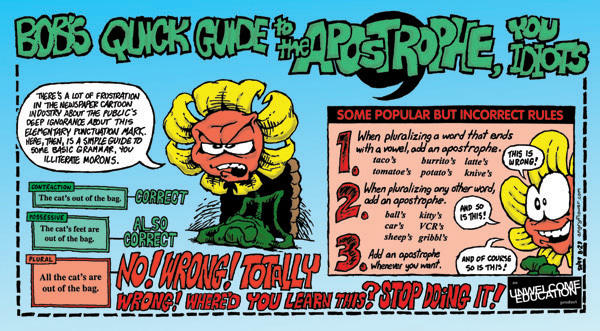djcphoto
An Englishman Abroad
Im confused.
Apostrophes and plural forms
The general rule is that you should not use an apostrophe to form the plurals of nouns, abbreviations, or dates made up of numbers: just add -s (or -es, if the noun in question forms its plural with -es). For example:
euro
euros
(e.g. The cost of the trip is 570 euros.)
pizza
pizzas
(e.g. Traditional Italian pizzas are thin and crisp.)
apple
apples
(e.g. She buys big bags of organic apples and carrots.)
MP
MPs
(e.g. Local MPs are divided on this issue.)
1990
1990s
(e.g. The situation was different in the 1990s.)
It's very important to remember this grammatical rule.
There are one or two cases in which it is acceptable to use an apostrophe to form a plural, purely for the sake of clarity:I've dotted the i's and crossed the t's.
- you can use an apostrophe to show the plurals of single letters:
Find all the p's in appear.Find all the number 7’s.
- you can use an apostrophe to show the plurals of single numbers:
These are the only cases in which it is generally considered acceptable to use an apostrophe to form plurals: remember that an apostrophe should never be used to form the plural of ordinary nouns, names, abbreviations, or numerical dates.
or is it art's?
Im confused.
Invasion of the Killer Apostrophe's what...😀
Apostrophes can be troublesome and commas can be so as well:
http://http://29.media.tumblr.com/tumblr_lroa0m44Ap1qab8zco1_500.jpg
Rob
It's all evolution, except where it's divergence and the evolution of dialects (as in the separation of Spanish and Portuguese -- "a language is a dialect with armed forces.")
I quite like diversity, but I also get a bit pissed off with both Americans and English people who fail to acknowledge that the two languages do not have common rules and usages (which I have done myself above, but at least I have the original spelling on my side).
Many people are too proud to acknowledge that they just lack a good foundation to speak and/or write their native language, and use the "language evolves" defense. One thing is to "evolve" and another to "devolve", which of course will be dismissed as "elitist" (another defense).

Eminently true, but that doesn't stop the fact that language does evolve, and that many "style" manuals are unduly worshipped (or of course worshiped) by their adherents, for no very convincing reason. I've always thought it amusing that a book published in Chicago (at least, I assume it's published there) presumes to lay down rules for the use of English.
